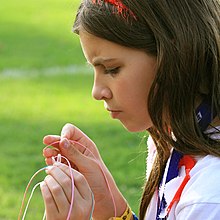
Back تركيز (علم النفس) Arabic Axın (psixologiya) AZ Flux (psicologia) Catalan Flow Czech Юхăм (психологи) CV Flow (psykologi) Danish Flow (Psychologie) German Fluo (psikologio) EO Flujo (psicología) Spanish Vookogemus ET

Flow in positive psychology, also known colloquially as being in the zone or locked in, is the mental state in which a person performing some activity is fully immersed in a feeling of energized focus, full involvement, and enjoyment in the process of the activity. In essence, flow is characterized by the complete absorption in what one does, and a resulting transformation in one's sense of time.[1] Flow is the melting together of action and consciousness; the state of finding a balance between a skill and how challenging that task is. It requires a high level of concentration. Flow is used as a coping skill for stress and anxiety when productively pursuing a form of leisure that matches one's skill set.[2]
Named by the psychologist Mihály Csíkszentmihályi in 1970, the concept has been widely referred to across a variety of fields (and is particularly well recognized in occupational therapy).[3][need quotation to verify]
The flow state shares many characteristics with hyperfocus.[4] However, hyperfocus is not always described in a positive light. Some examples include spending "too much" time playing video games or becoming pleasurably absorbed by one aspect of an assignment or task to the detriment of the overall assignment. In some cases, hyperfocus can "capture" a person, perhaps causing them to appear unfocused or to start several projects, but complete few. Hyperfocus is often mentioned "in the context of autism, schizophrenia, and attention deficit hyperactivity disorder – conditions that have consequences on attentional abilities."[4]
Flow is an individual experience and the idea behind flow originated from the sports-psychology theory about an Individual Zone of Optimal Functioning. The individuality of the concept of flow suggests that each person has their subjective area of flow, where they would function best given the situation. One is most likely to experience flow at moderate levels of psychological arousal, as one is unlikely to be overwhelmed, but not understimulated to the point of boredom.[5]
- ^ Ellis, Gary D.; Voelkl, Judith E.; Morris, Catherine (September 1994). "Measurement and Analysis Issues with Explanation of Variance in Daily Experience Using the Flow Model". Journal of Leisure Research. 26 (4): 337–356. Bibcode:1994JLeiR..26..337E. doi:10.1080/00222216.1994.11969966. ISSN 0022-2216.
- ^ Mirvis, Philip H. (July 1991). "Flow: The Psychology of Optimal ExperienceFlow: The Psychology of Optimal Experience, by Csikszentmihalyi Michael. New York: Harper & Row, 1990, 303 pp., $19.95, cloth". Academy of Management Review. 16 (3): 636–640. doi:10.5465/amr.1991.4279513. ISSN 0363-7425.
- ^ Csikszentmihályi M (1990). FLOW: The Psychology of Optimal Experience (PDF). Harper and Row. ISBN 978-0-06-016253-5. Archived from the original (PDF) on 25 February 2015. Retrieved 2 April 2015.
- ^ a b Ashinoff, Brandon K.; Abu-Akel, Ahmad (2021-02-01). "Hyperfocus: the forgotten frontier of attention". Psychological Research. 85 (1): 1–19. doi:10.1007/s00426-019-01245-8. ISSN 1430-2772. PMC 7851038. PMID 31541305.
- ^ Sanderson, Catherine (2016). Sport Psychology. Oxford University Press. pp. 164–165. ISBN 978-0-19-991744-0.